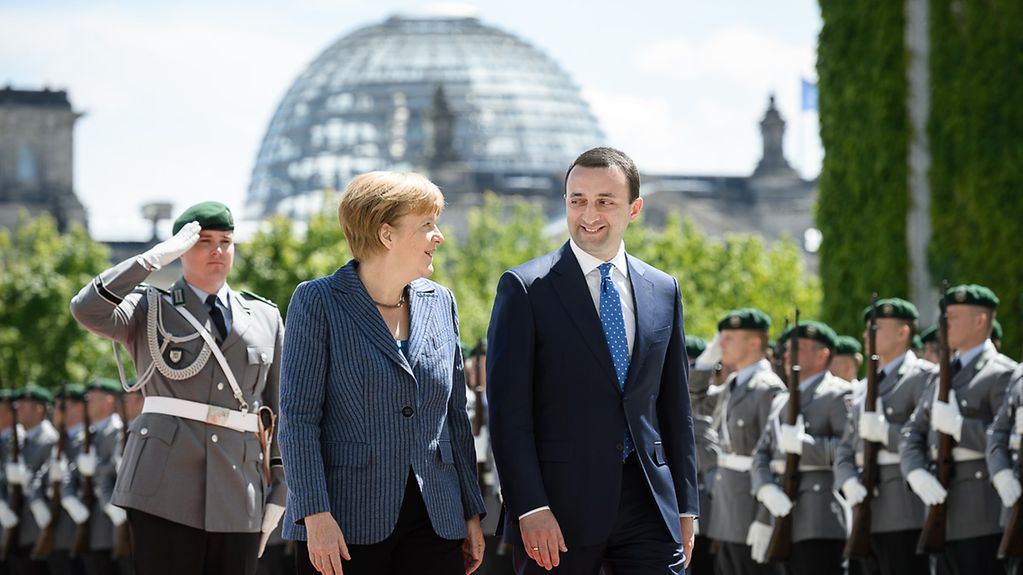Angela Merkel receives Irakli Garibashvili
Germany and Georgia aim to step up economic cooperation in future, agreed Chancellor Angela Merkel and Prime Minister Irakli Garibashvili during the inaugural visit of the Georgian head of government to Berlin. Today, Georgia is "a good place to invest," said Angela Merkel.
3 min reading time

Angela Merkel praised Georgia's economic progress
Photo: Bundesregierung/Steins
Chancellor Angela Merkel welcomed Georgia’s Prime Minister Irakli Garibashvili at the Federal Chancellery in Berlin with military honours. At dinner, they then discussed political and economic matters.
Georgia moves closer to EU
Georgia has been moving closer to the European Union and is soon to sign an Association Agreement with the EU, reported Angela Merkel. Irakli Garibashvili thanked the Chancellor for her support in setting up the Agreement, and stressed Georgia’s interest in becoming a full member of the EU.
In the crisis in Ukraine, Georgia’s Prime Minister believes that dialogue is the best way forward. He is convinced that this is the only way "to achieve a positive outcome". Georgia itself has demonstrated that "it is possible to maintain constructive, normal relations with Russia and thus resolve problems between two states," he said. His country aims to be an example of how it is possible to be part of Europe while also cooperating with Russia. "We have been getting positive signals from both sides," Irakli Garibashvili continued.
Angela Merkel praised the course taken by Georgia’s government. The country is moving closer to the EU, while investing a great deal of effort in "gradually developing relations with Russia". The example of Georgia demonstrates that "it need not be a case of either/or".
Extending economic cooperation
The Chancellor had much praise for Georgia’s economic progress. In the past, political instability in the country, especially against the background of events in Abkhazia and South Ossetia, scared off many investors. Today, she stressed, Georgia is a good place to invest.
Angela Merkel and Irakli Garibashvili praised the long tradition of their two countries in cooperating in the fields of research, education and other academic and scientific domains. Both affirmed their commitment to stepping up and extending economic relations.
With the agreement on the promotion and mutual protection of capital investment and the tax convention for the avoidance of double taxation, a basis exists in international law for bilateral economic exchange between Germany and Georgia. Germany is currently Georgia’s sixth largest trading partner, with trade worth a total of 522 million US dollars (as at the end of 2013). Germany’s exports to Georgia still account for 86 per cent of bilateral trade, with vehicles, machinery, chemical products, electric and optical products and medical drugs among the main items exported.
No immediate plans for Georgia to join NATO
The Chancellor stated that there are no immediate plans for Georgia to join the North Atlantic Treaty Organization (NATO). "We see the progress that Georgia is making," she added.
She also pointed out that Georgia is involved in several NATO and EU missions. At the NATO summit in September it is thus to be made quite clear that Georgia is "a good partner" for difficult missions.
German-Georgian relations can look back on a long tradition. On 23 March 1992 Germany was the first European Community state to officially recognise Georgia, following independence in 1991. On 13 April 1992 diplomatic relations were established.
Germany has not forgotten the role played by the former Soviet Foreign Minister and subsequent President of Georgia Eduard Shevardnadze in bringing about German unification. Within the EU, Germany is working to bring Georgia and the region as a whole closer to the EU. It has actively supported the creation of the EU-Eastern Partnership.